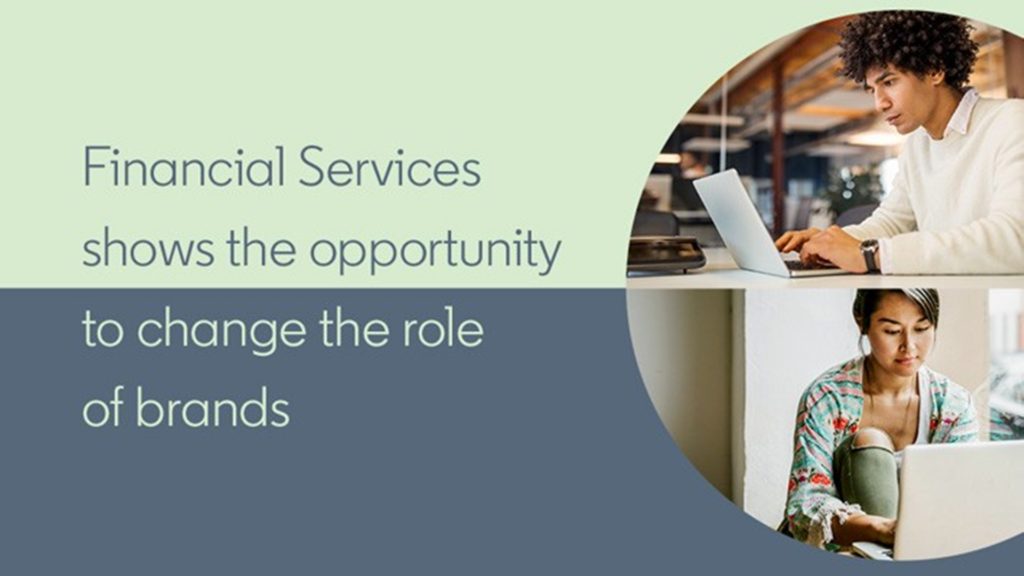The last time the world faced a global crisis, FinServ brands were seen as the cause of the problem. This time, they’re taking a visible role in solutions
There are plenty of marketing cynics who will tell you that brands don’t have as big a role in people’s lives as marketers would like to believe. However, there are times – often very difficult times – when that changes. Sometimes a situation illuminates in just how many ways the brands in our lives intersect with what matters to us. For Financial Services brands, this is one of those situations.
Like every business and every individual, FinServ companies are dealing with previously unimagined challenges. However, they are also in a unique position when it comes to making a difference in response. During the global financial crisis, the complex ways in which all people’s lives are intertwined with finance was the problem. Today, it’s enabling these brands to play a multi-dimensional role as part of the solution. And although the sector is distinct in many ways, the principles that forward-thinking marketers are applying in Financial Services could also shape the role of brands elsewhere.
Protecting the everyday
Even in today’s exceptional circumstances, people still need to use banking services on a daily basis – and many other FinServ brands have launched services that give them a regular role in their customers’ lives. This gives these brands an immediate role in keeping people safe and keeping their lives functioning. Whether announcing simple adjustments to services or sharing ideas for doing things more safely, thoughtful communication can make a meaningful difference to people’s lives at scale.
For the French regional retail bank, Banque Populaire, this involved reminding people of the different payment methods they could use to avoid physical contact. In China, insurance brand Ping An updated its iShenzen mobile app for residents of its home city of Shenzen. As a result, people were able to access medical consultations and up to 95% of municipal services, without going outside. Natixis Assurances took a different approach, acknowledging the stresses of looking after young children while working remotely, and reminding parents of simple steps to help avoid household accidents.
More broadly, leaders of FinServ companies have been quick to address the issue of protecting their employees in frontline roles – and in doing so, helping to protect the rest of the population. Video messages and written posts from the likes of Crédit Agricole Group CEO, Philippe Brassac and BNP Paribas CEO Jean-Laurent Bonnafé thanked employees for their commitment – and spelled out the measures that banks are taking to keep them safe. More than just a piece of communication, the style of these messages helped to humanise a category that can sometimes seem faceless – and provide greater reassurance in times of crisis.
Not every business touches people’s lives as regularly as those handling their money. However, any business with customers has the potential to explore how delivering services and expertise in new ways could make a difference for them.
Mitigating the impact of the crisis
Major banking brands have one notable advantage that enables them to make a broader difference during a crisis: they tend to have strong balance sheets. In the early months of the pandemic many have deployed their financial resources in ways that respond directly to the threat of the pandemic, and aim to accelerate the recovery.
For some, this involved addressing the needs of frontline healthcare workers directly. Banco Santander in Spain generated huge levels of engagement by sharing video of the million protective masks that it helped supply for the health ministry in Spain. Others acted swiftly to address the devastating economic consequences of the pandemic. In Italy, Intesa SanPaolo announced that it had set aside €15 billion to provide liquidity to the country’s SMEs during the lockdown period and beyond.
At first glance, brands in other sectors can’t replicate these types of initiatives. Many are in survival mode with no additional funds to invest in tackling the immediate consequences of the crisis. However, every business has a potential role in the recovery – sometimes just by continuing to be there for its customers, and anticipating their needs. This is a time to demonstrate the purpose behind what your organisation does – the reason it exists, and the reason it matters.
Setting out a vision for the future
These first two dimensions of FinServ brands’ response have provided much-needed reassurance, and addressed immediate needs. However, as we enter a new phase of the situation, there’s a different need that they can address – and one with potentially even longer-term benefits.
The actions that banks and others have taken so far have helped to earn their audiences’ attention. They now have the potential to leverage that attention to set out a compelling vision for the future: how the world can recover from the crisis in the long-term, and what that recovery could and should look like.
Several asset management brands have already started to act on this opportunity. BlackRock has led with bold views about how it sees the financial consequences of the current situation, stressing the key differences between today and the global financial crisis, and acting to prevent panic. Lombard Odier takes an even more visionary approach, sharing thought leadership that argues the case for clean economic stimulus, and using the aftermath of the crisis as an opportunity to transition to a low-carbon economy.
At a time of such immense disruption, audiences are more open than ever to alternative ways of seeing the future. And when businesses earn trust and demonstrate credibility, their ideas have a willing audience. A growing number of Financial Services brands have earned the right to be heard on what happens next. That same opportunity exists for any business prepared to take a thoughtful view of its wider role in the current crisis.
Business.LinkedIn / Balkantimes.press
